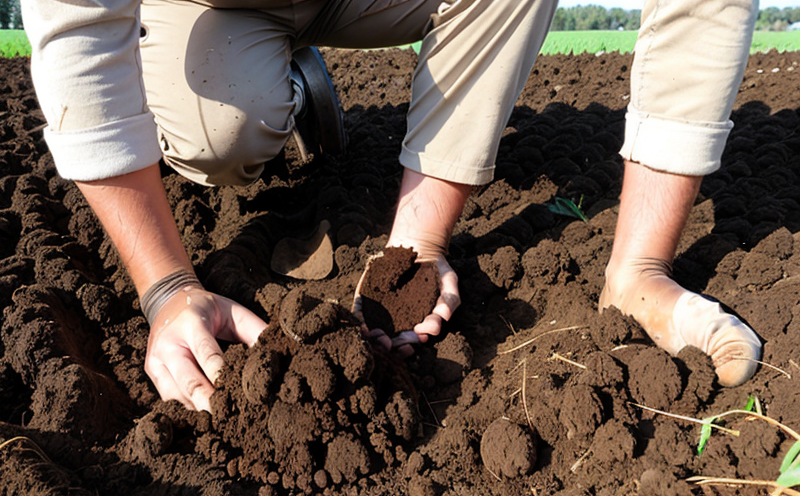Soil Overall Fertility Assessment
Soil overall fertility assessment is a comprehensive evaluation of soil health and its capacity to support plant growth. This service involves analyzing various parameters that contribute to the fertility of agricultural soils, including nutrient content (macronutrients like nitrogen, phosphorus, potassium; micronutrients such as zinc, iron, manganese), organic matter levels, pH balance, and soil structure.
The importance of this assessment cannot be overstated. A fertile soil is essential for optimal crop yields, enhanced plant health, and sustainable agricultural practices. Poor soil fertility can lead to stunted growth, reduced yield, increased susceptibility to diseases, and diminished quality of produce. By assessing the overall fertility of soils, we ensure that agricultural operations are conducted in a way that maximizes productivity without compromising environmental sustainability.
The process begins with collecting representative samples from different areas within a field or plot. These samples are then processed using advanced laboratory techniques such as spectrophotometry for nutrient analysis and pH testing equipment to measure soil acidity or alkalinity. Once the raw data is obtained, it undergoes rigorous statistical analysis to determine if any deficiencies exist.
Macronutrients play crucial roles in photosynthesis, root development, flowering, and fruiting processes. For instance, nitrogen supports leaf production while phosphorus aids root establishment; potassium promotes overall plant vigor by regulating water use efficiency and enzyme activity within cells. Micronutrients, though required only in trace amounts, are vital for enzymatic reactions that facilitate nutrient absorption and utilization.
Organic matter content influences several soil attributes including water retention capacity, aeration levels, microbial activity, and cation exchange ability – all factors critical to sustaining healthy root systems. Adequate organic matter ensures robust populations of beneficial microorganisms which contribute positively towards nutrient cycling within the rhizosphere environment.
The pH level significantly affects how well plants absorb essential minerals from surrounding soil matrix. Ideal ranges vary depending upon crop type but generally fall between 6 and 7 on a logarithmic scale ranging from acidic (lower values) to alkaline (higher values). Soil with excessively high or low pH levels may render certain nutrients unavailable for plant uptake, thus necessitating corrective measures such as liming or acidification treatments.
Our laboratory employs state-of-the-art analytical instruments and adheres strictly to internationally recognized standards including ISO 17025 & EN ISO/IEC 17025:2017 when conducting these assessments. This ensures accurate, reliable results that form the basis for informed decision-making regarding soil management strategies.
Understanding your soil's overall fertility allows you to implement targeted interventions aimed at rectifying any deficiencies identified during our assessment. Whether through organic amendments, synthetic fertilizers, or cultural practices like cover cropping and crop rotation, we provide tailored recommendations designed specifically for your unique agricultural situation.
Why It Matters
The importance of soil overall fertility cannot be overstated in modern agriculture. Healthy soils not only enhance plant health but also contribute to long-term sustainability by reducing environmental impacts associated with conventional farming methods. Properly managed soils help mitigate issues like erosion, water pollution due to runoff, and greenhouse gas emissions.
- Enhanced Crop Yield: Optimal soil fertility leads directly to increased crop yields without increasing input costs. This translates into higher profit margins for farmers while minimizing pressure on natural resources.
- Better Plant Health: Nutrient-rich soils support robust plant growth, leading to stronger stems and leaves capable of resisting pests and diseases more effectively.
- Sustainable Farming Practices: By understanding your soil's needs accurately, you can adopt sustainable practices such as reduced chemical use or integrated pest management systems that promote ecological balance.
- Environmental Benefits: Healthy soils improve water quality by reducing non-point source pollution, contribute to carbon sequestration, and maintain biodiversity through diverse ecosystems supported by well-functioning agricultural landscapes.
In essence, soil overall fertility assessment is not just about diagnosing current conditions; it’s also about preventing future problems. It provides a roadmap for sustainable land use practices that benefit both present and future generations.
Eurolab Advantages
At Eurolab, we pride ourselves on providing unparalleled services in soil overall fertility assessment backed by years of experience and cutting-edge technology. Our team comprises highly skilled professionals who are dedicated to delivering accurate, reliable results every time.
- Comprehensive Analysis: We offer a holistic approach encompassing all key aspects affecting soil health including physical properties like texture, structure, water-holding capacity alongside chemical parameters mentioned earlier.
- International Standards Compliance: Our analyses are conducted according to ISO 17025 & EN ISO/IEC 17025:2017 ensuring compliance with global best practices recognized worldwide.
- Rapid Turnaround Times: We understand the urgency of obtaining results for timely intervention. Therefore, our labs operate efficiently so that clients receive their reports promptly after sample submission.
- Tailored Recommendations: Based on findings from each assessment, we offer customized advice aimed at addressing specific issues faced by individual farms or fields.
- Digital Reporting: All results are presented in easy-to-understand formats complete with visual aids like graphs and charts to aid interpretation.
Choose Eurolab for your soil overall fertility assessment needs. With us, you get more than just data; you gain actionable insights that drive better decisions and outcomes across your entire farm or plantation.





